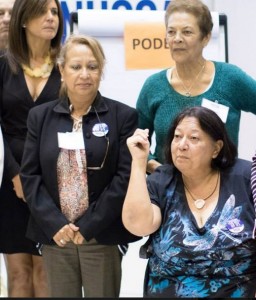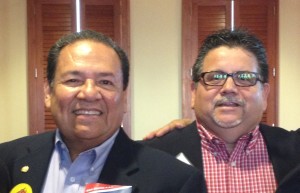When members of our diverse elder communities work together, it feels like there is so much power, shared history, and ambition in the room. We’ve loved hearing stories of multiple organizations getting together to work on issues around the White House Conference on Aging, for example, like our May 7th Listening Session in Los Angeles. Coalition- and community-building are so important to the vitality of our constituencies. At the Diverse Elders Coalition, we’re really glad to be making these connections and amplifying the voices of our communities.

Latina elders and advocates at NHCOA’s Miami event on June 4th
Our member organization the National Hispanic Council on Aging (NHCOA) has been hosting a series of regional meetings and community empowerment training programs around the country over the past few months. The images and videos coming out of those sessions have been so inspiring. Empowerment is incredibly important for our elders, since so often in our culture and our society, age is equated with disempowerment. We want our diverse elder communities to be strengthened by the bonds between each other and feel capable of standing up for themselves and making change.
All this is to elaborate why I like Brad and Mike’s story so much. They formed a strong bond during a snowy winter in Washington, DC and used their love for one another to propel their activism in both the Latino and LGBT communities. Together, they organized and served as elected officers of LGBT Latino organizations in Houston and San Antonio. Brad and Mike helped organize the first Latino LGBT organization in Washington, D.C. called ENLACE and later played a role in the the formation of LLEGO, the National Latino/a Lesbian & Gay Organization. And most inspiring, during the AIDS crisis, they organized and helped with a “buddy system” to support their friends, family, colleagues and comrades with AIDS. This work across community lines has helped enhance Brad and Mike as individuals and as a couple, and it has certainly made the world a better place.

As we approach the July 13th White House Conference on Aging, I will be keeping Brad and Mike’s story in the back of my mind. Supporting one another — as individuals and as communities — feels like the key to making change, as I’ve learned during my time with the Diverse Elders Coalition. I hope you will join us by sharing your story or commenting on the four WHCOA policy briefs. What does your community need to be stronger? How are you making connections to build that strength? We’d love to hear from you.
The opinions expressed in this article are those of the author and do not necessarily reflect those of the Diverse Elders Coalition.

